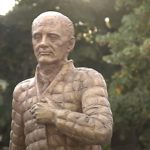What does it mean if one state erects a memorial to the leader of another state whose people would not even consider honouring him with a street name?
In Dessau, a town located in the former east German Democratic Republic, on the occasion of the 30 anniversary of the reunification of Germany (3 October 1990), a monument to Mikhail Gorbachev was unveiled. The municipality’s mayor held a speech as did some other guests in an open-air ceremony. A letter from the former first and last president of the Soviet Union was read out loud, and an orchestra made musical intervals, playing Dimitr Shostakovitch’s most famous Second Waltz, the German National Anthem and The Winds of Change by the German rock group Scorpions, a hit that at the time of the fall of the Berlin Wall did the rounds across Europe. The event was attended by a representative of the Russian embassy.
In his speech, Hans-Georg Otto, Dessau’s mayor, gave a brief historical account of the events that led to the reunification of Germany and placed special emphasis on the role played by Mikhail Gorbachev, without whose commitment – as he stressed – we would still have two German states. The mayor reminded the audience of the long-standing friendship that tied Germans and Russians throughout history.
Source: YouTube.
It is not the first time that Germany owes gratitude to Russians.
[1] The Seven Years’ War would have ended in a complete routing or even obliteration of the Kingdom of Prussia but for the decision of Tsar Peter III, who, being an admirer of everything German, issued an order withdrawing Russian troops – which had already conquered Berlin! – from Prussia, thus reversing the intent of his predecessor on the throne to cooperate with the other states forming the anti-Prussian coalition intent on waging the war till the enemy was annihilated. Though Peter III was not commemorated with a stone memorial in Prussia, his deed went down in history as the Miracle of the House of Brandenburg – a phrase coined by Frederich the Great, the true hero of the said war – a phenomenon on whose re-occurrence Adolf Hitler counted.
[2] The same Prussian state felt obliged to another tsar – Alexander I – for his aid in fighting Napoleon’s troops and so named a big square in Berlin after him: Alexanderplatz.
[3] The East German communists renamed Große Frankfurter Straße to Stalinallee, probably in gratitude for installing them in the position of power. A monument to the great leader of the Soviet Union was put up in due time soon after. This monument did not survive long, though. East German authorities were also conducive in the erection of a few other Soviet monuments of which the Soviet War Memorial (a soldier wielding a sword in one arm and holding a saved German child in the other) in Treptower Park belongs to the most recognizable.
What is of interest in the case of these memorials are the often different perceptions of the persons they were or are devoted to in the two nations concerned. Peter III was dethroned soon after he had made that fateful decision and does not belong to great Russian rulers. Alexander I has his memorial in Taganrog, Russia, and though destroyed by the Bolsheviks, it was reconstructed in the post-soviet era. The case of Mikhail Gorbachev is rather similar to that of Tsar Peter III. Both rendered invaluable service to a German state and both are despised at home. Especially Mikhail Gorbachev, because Peter III admittedly saved Prussia but at least did not destroy Russia – or was not allowed to by the elites. One might legitimately say that Mikhail Gorbachev united Germany at the cost of disuniting the Soviet Union. That in itself might be forgiven by some – after all what does Russia need the Baltic or the Central Asian states for? – but for the fact that the standard of living in post-Soviet Russia and Ukraine was so low for at least a decade that even life expectancy spiraled down and the population (especially in Ukraine, but also in the Baltic States) shrank by millions while Russia – once a big player on the geopolitical chessboard – was demoted to the status of the West’s client state. Present-day Russian patriotic circles – whether right- or left-wing – despise Mikhail Gorbachev intensely and no one would consider putting up a monument to or name a street after him. The degradation from a world leader down to a face advertising for Pizza Hut that he himself enacted was a grotesque finale.
How does it feel when as a politician you are honoured in a foreign country but shown disrespect in your own?
Source: YouTube.




